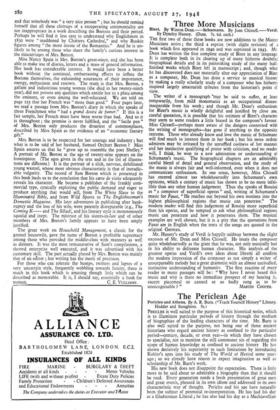Three More Musicians
Bizet. By Winton Dean.—Schumann. By Joan Chissell.—Verdi. By Dyneley Hussey. (Dent. 7s. 6d. each.)
THE first two of these three books are new additions to the Master Musicians series ; the third a reprint (with slight revision) of a book which first appeared in 1940 and was reprinted in 1943. Mr. Dean has written the first complete study of Bizet in any language. It is complete both in its clearing up of many hitherto doubtful biographical details and in its painstaking study of the many half- finished works which Bizet left in manuscript ; and, though what he has discovered does not materially alter our appreciation of Bizet as a composer, Mr. Dean has done a service to musical history by making a really scholarly study of a composer who has hithert) inspired largely amateurish tributes from the historian's point cf view.
The writer of a monograph may be said to suffer, at least temporarily, from mild monomania as an occupational disease inseparable from his work ; and though Mr. Dean's enthusiasts for Bizet's music is wholly delightful and justified by close anc careful quotation, it is possible that his estimate of Bizet's charactet may seem to some readers a little biased in the composer's favour. Miss Chissell—perhaps more aware of the dangers connected witli the writing of monographs—has gone if anything - to the opposite extreme. Those who already know and love the music of Schumanr, will find much to interest them in her book ; but his more ardent admirers may be irritated by the unruffled coolness of her manner and her instinctive qualifying of praise with criticism, and no reader will, I think, be won to a new admiration or understanding of Schumann's music. The biographical chapters are an admirably careful blend of detail and general observation, and the study of the music is always fair and well-informed, even when it does not communicate enthusiasm. In one sense, however, Miss Chissell has entered almost too wholeheartedly into Schumann's own opinions, which a century of music has shown to be no more infal- lible than any other human judgement. Thus she speaks of Rossini as " a composer of superficial operas " and, writing of Schumann's music for Faust, "He reaches out beyond his own motions into the highest philosophical regions that music can penetrate." The modern reader will find this judgement of Rossini more superficial than his operas, and be tempted to ask what philosophical regions music can penetrate and how it penetrates them. The musical examples are well chosen, but it is a pity that the quotations from Faust are in English when the texts of the songs are quoted in the original German.
Mr. Hussey's study of Verdi is happily midway between the slight excesses of Mr. Dean and Miss Chissell. He treats the composer quite wholeheartedly as the giant that he was, not only musically but in his ability to delineate human character. His analysis.of the greatest operas and Verdi's own ideas about libretti all confirm the modern impression of the composer as not simply a writer of unsurpassable melody but a great dramatist with an almost unrivalled, instinctive understanding of humanity. The first reaction of every reader to many passages will be: " Why have I never heard this music and why is there no immediate prospect of my hearing it, except piecemeal or canned or so badly sung as to be


































 Previous page
Previous page